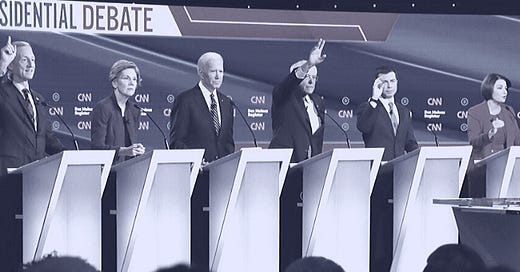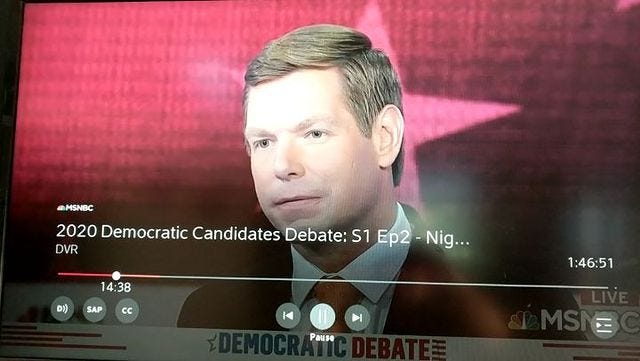
Months ago, my wife and I were so intrigued by the sheer number of Democratic presidential candidates vying for their party's nomination that we decided, purely in the interest of entertainment, to check out the first few debates. They ended up being even bigger spectacles than we were expecting.
Perhaps it was because we had no skin in the game, but it was downright amusing to watch an overflowing stage of familiar curmudgeons and new-blood hopefuls almost trip over each other to shamelessly pander to the extreme wing of their political base. This included promising voters (and even non-citizens!) a long list of "free" stuff including health care, college educations, and even cold, hard cash. Who was going to pay for all of this (with a national debt of $23 trillion)? The rich, of course! How original.
On immigration, candidates vowed to not only abolish ICE, but decriminalize illegal border entries all together.
On abortion, the message was simple: Go for it! We don't need no stinkin' restrictions.
The cast of characters and unexpected soundbites only added to the circus, from Marianne Williamson's new-age lingo, to Eric Swalwell's hyper-feminist stances and embarrassing one-liners, to what is still my favorite exchange with a debate moderator:
My wife and I certainly had a lot of fun with the clown show, giving it the Mystery Science Theater 3000 treatment. But over the months, as the field thinned out, and the handful of candidates who actually ended up sounding a bit reasonable were forced to end their campaigns, the primary became much more of a drag. The debates have grown exhausting, and the remaining candidates are even less personally appealing now than they were at the beginning of the process.
I can't think of a better illustration of this than at last night's debate (the final one before the Iowa Caucus), when Elizabeth Warren and Bernie Sanders bickered for what seemed like an eternity over how long it has been since Sanders has beaten a Republican incumbent.
The Dispatch's Jonah Goldberg captured the moment quite well on Twitter:

And that was one of the more exciting moments!
Now, I'm not expecting to see the level of dramatics we see at Trump rallies, but the truth of the matter is that the pizazz factor is crucially important to today's electorate. I would even argue that personality and political theater have been the deciding factors in every presidential election over the past two or three decades.
I'm not saying that's a good thing; I'm a believer in substance, myself. But that's where we're at as a country. And what we're left with right now in the Democratic primary is not a basket of "deplorables," but rather insufferables.
Bernie Sanders has become a tired parody of his wide-eyed socialist self. Elizabeth Warren is rhetorically grating to the average person, and can't answer simple challenges to her policy ideas (or even her own bio). Tom Steyer, with his blank gaze and monotone delivery, somehow manages to fade into the background even when he's the only person on camera. Joe Biden has his folksy charm and still speaks with some confidence, but far too often appears lost. Amy Klobuchar seems like a genuinely good person, and probably holds the sanest policy positions of the remaining candidates, but she’s chronically uncomfortable in her own skin, and tends to fall back on old talking points and tired metaphors whenever she's rattled. Mayor Pete is a gifted speaker and usually hits some positive notes; maybe he's the exception, but he has some significant base challenges to overcome.
Now, to be fair, this is a Democratic primary we're talking about. As a small-government conservative, I'm not exactly the audience or type of voter these candidates are trying to impress. But one of the individuals we saw on stage last night (despite there being other remaining candidates) will very likely become the party's nominee and Donald Trump's general-election opponent. And that person is going to have a very rough time if he or she can't personally inspire voters beyond just the portrayal of themselves as the anti-Trump alternative.
That's not to say there isn't any hope. Of course there is. Hillary Clinton was one of the most unappealing presidential nominees in American history, and she still managed to earn 3 million more votes than Donald Trump. If just 78,000 voters among three swing-states had chosen differently in 2016, Hillary would be president right now.
The problem is that it will be even harder for the Democrats in 2020. Trump is no more likeable or competent than he was four years ago, but he's the incumbent and the economy has been strong. It would have been good for the Democratic party if their base would have accepted that reality months ago, recognized the challenge they were dealing with, and put their support behind thoughtful, personally appealing candidates who — at minimum — weren't vowing to change the very fundamentals of our strong economy.
But that would have been too easy. They've instead chosen to hand the president another electoral gift. At least it sure appears that way.
—













